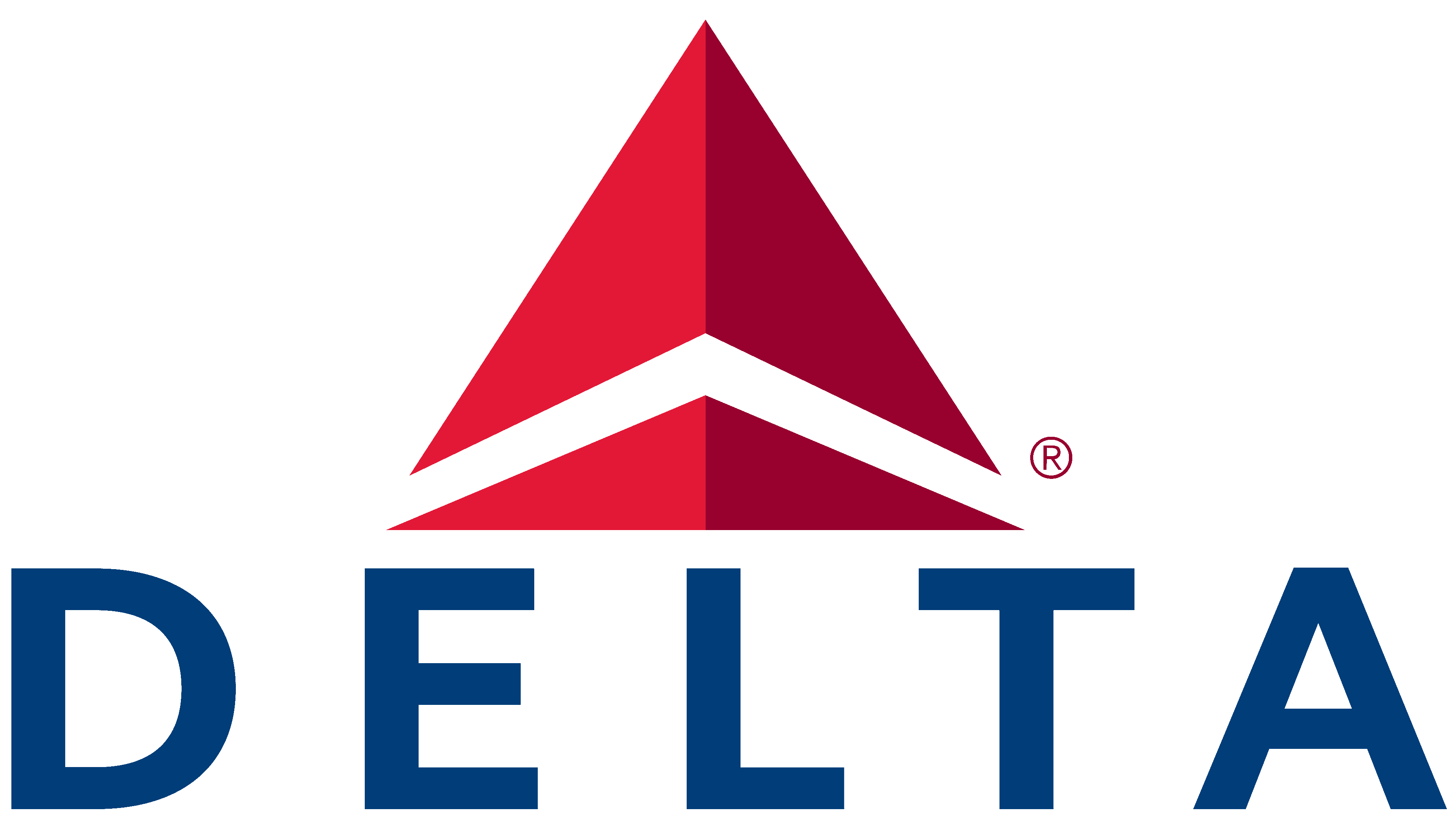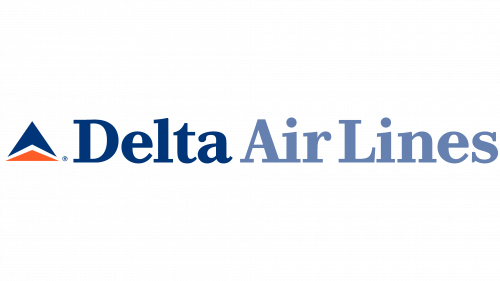Delta Airlines Logo
Delta Air Lines, an esteemed leader in the aviation sector, commenced as Huff Daland Dusters in 1925 in Georgia, primarily engaging in agricultural dusting. It evolved significantly over the years, transforming into a prominent American carrier known for its extensive fleet and vast passenger network.
Meaning and history
Initially catering to the southeastern U.S., Delta expanded its horizons through a series of mergers and acquisitions, notably adopting the Delta Air Service name in 1928. Post-WWII, it diversified and extended its reach both domestically and internationally, setting a benchmark in the industry for innovation, especially with the introduction of jet services.
The 2008 merger with Northwest Airlines marked a pivotal expansion, bolstering Delta’s global footprint. Headquartered in Atlanta, Georgia, Delta operates a comprehensive network worldwide as a key member of the SkyTeam alliance, engaging in extensive codeshare partnerships.
Despite industry challenges, including economic shifts and the COVID-19 pandemic, Delta has maintained its stature, known for its commitment to customer service, efficiency, and a broad route network. Its journey from a humble dusting operation to a global aviation icon reflects its enduring legacy and adaptive strategies in the dynamic airline industry.
What is Delta?
Delta is a prominent American airline, making thousands of flights to 300+ destinations around the world with a park of 955 planes. Comfort, speed, convenience, and safety have been the company’s main priorities since its foundation in 1925.
1925 – 1928
The inaugural logo of Huff Daland Dusters showcases a vibrant illustration within a triangle, emphasizing the company’s agricultural roots with a crop-duster biplane. The detailed image combined with bold lettering around the border represents robustness and reliability.
1928 – 1930
Transitioning to air travel, this logo features Hermes with a distinctive winged hat, going beyond the red-and-black triangular frame, which spells ‘Speed, Safety, Comfort’ to assure passengers of a pleasant flying experience. The white plate with the inscription ‘Delta Air Service’ lies below the head.
1930 – 1934
The emblem gently nods to the airline’s agrarian roots with a triangular design, evoking the era’s crop-dusting heritage. The use of a modern sans-serif font labeled ‘Delta Air Corporation LA’ adds a contemporary and industrial touch, bridging past and future.
1934 – 1951
Embracing a classic American look, the logo features a navy blue circular crest, with the airline’s name in a dignified serif font. A central red delta, accompanied by stylized wings, suggests a graceful flight. The patriotic red, white, and blue colors convey balance and comforting reliability.
1934
A badge-like logo blooms with American pride, featuring a metallic sheen and the nation’s flag colors. A red triangle with delicate lines, a blue circle bearing the brand name, and detailed inscriptions of addresses and routes create a sense of trust and patriotism.
1935
The 1935 logo is a serene blue triangle, inscribed with ‘Comfort’, ‘Speed’, and ‘Convenience’, and cradling a smaller red triangle. This harmonious emblem is decorated with a name caption and a third blue-and-white triangle, graced by two majestic eagle wings.
1945 – 1953
A deep blue oval embraces a bespoke typeface for ‘Delta Air Lines,’ radiating a personal touch. The sleek wing coming from the initial ‘D’ symbolizes a hopeful journey into a prosperous, peaceful future.
1953 – 1955
Introducing ‘Delta C&S,’ this logo celebrates a merger with a compass motif, symbolizing extensive coverage. The motto ‘Serving the Heart of America’ warmly reaffirms a dedication to uniting diverse regions.
1955 – 1959
Wrapped in an oval, the logo’s red and blue tones and a fluid cursive script for ‘Delta’ convey emotion and elegance. Beneath, ‘Air Lines’ in a legible sans-serif anchors the design. Friendly slogans embrace the logo, portraying the airline as a beacon of swift and luxurious southern travel.
1959
The ‘Royal Jet Service’ logo dons a crown-like black triangle atop a red delta, with a golden outline. The elegant text and design elements wrap the airline in a luxurious, regal atmosphere.
1959 – 1962
A minimalist red delta symbol and large title case name caption appear alone for the first time on the 1959 logotype.
1962 – 1966
Two red and blue delta symbols are placed within a blue oval, surrounded by a red outline. Similar to the previous versions, the centerpiece of this logo is the nameplate ‘Delta Air Lines’.
1963 – 1993
In this logo, the well-known symbol of two large triangles in red and blue is framed by a dark frame that resembles a globe. Solid text typed in capital letters confirms Delta’s reputation and reliability.
1966 – 1976
A modern, angular blue symbol flanks the word ‘DELTA’ in a clear, assertive typeface. The widget separates the airline’s name, crafting an instantly recognizable and confident brand image.
1976
Celebrating America’s Bicentennial, this logo blends patriotism with a red and white striped triangle and a starry blue field. ‘DELTA AIR LINES’ circles the emblem, while ‘WE THE PEOPLE’ and ‘1776-1976’ commemorate the nation’s history.
1985 – 1987
A gentle, friendly script for ‘Delta Air Lines’ set against a light blue backdrop creates an inviting feel, focusing on passenger comfort and approachability.
1987 – 1995
The logotype evolves into an uppercase name caption beside a sophisticated wing emblem. For the first time in many years, they have used a slender, elegant serif typeface to write the company’s wordmark.
1993 – 1995
A lighter blue hue brings a tranquil, reliable ambiance to the same composition. ‘Air Lines’ is added beneath ‘Delta’ in a matching typeface to maintain the design’s integrity.
1995 – 2000
This logo depicts the full company name, while darkening the word Delta and whitewashing the Air Lines part. The traditional triangular emblem finds its place to the left of the text.
2000 – 2004
The logo features more abstract, rounded triangles and a bolder, modern sans-serif ‘Delta’.
2004 – 2007
Returning to angular triangles, this iteration maintains the clear nameplate, representing Delta’s steadfast commitment to progress and customer service.
2007 – Today
The current logo distills the brand to its essence, with a singular red icon, placed aside the name in a simple, bold, and recognizable typeface. The simplicity of the design embodies the airline’s commitment to straightforwardness and customer focus.
Font
The typefaces used throughout the evolution of Delta Air Lines’ logos vary, but several key trends are evident. The earliest logos from 1925 to 1930 used serif fonts, which have small lines attached to the ends of letters, indicative of traditional and established sensibilities. Moving into the 1930s and through the 1950s, the typeface gets bolder and more streamlined, reflecting the modernist design trends of the time with sans-serif fonts that emphasize clarity and simplicity.
From the 1960s onwards, logos generally maintain the use of sans-serif typefaces with varying degrees of boldness and italicization to convey a sense of forward motion and progress. The typeface from the 2000s onwards simplifies further into a highly minimalist sans-serif, representing a modern and efficient image.
Color
The company’s logotypes tend to use a palette of black, red, and white, which are often associated with strength and passion (red), purity and simplicity (white), and formality and elegance (black). The red and blue color scheme becomes prominent from the 1930s onwards, with blue often symbolizing trust, dependability, and stability—qualities desirable in an airline. The exact shades of red and blue vary, with some logos opting for a deeper, navy blue, while others use a brighter, more vibrant blue.
The inclusion of a bicentennial logo in the 1976 version incorporates a patriotic red, white, and blue theme. This tri-color scheme is a nod to the American flag, furthering the airline’s association with American values and heritage. From the 1980s onwards, the logos have simplified to mostly use variations of red and blue, with the contemporary logo as of 2007-now adopting a solid, triangular red icon accompanied by the word ‘DELTA’ in a deep blue, maintaining a strong visual identity that is recognizable and modern.

































